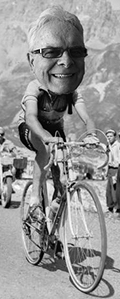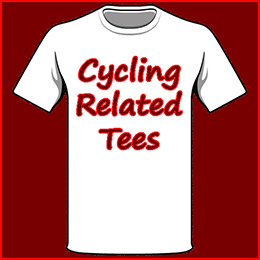In the Dumpster of Life
 Mon, February 7, 2022
Mon, February 7, 2022  People email me with all kinds of questions about bikes and I have to admit I know a lot, but not everything.
People email me with all kinds of questions about bikes and I have to admit I know a lot, but not everything.
Someone might find a frame in the dumpster and email me pictures asking if I know what it is.
I may know, I may not, I may offer an educated guess.
When looking for answers, concentrate on what you already know, not on what you don’t know. When you pull a frame from the dumpster look at the dropouts. Are they forged steel like Campagnolo? If so, it is probably a quality frame. If the dropouts are stamped from sheet steel, it is of lesser quality.
The exception would be, if it were an antique, pre dating forged dropouts. (1950s and earlier.) Then you look at the quality of the lug work, etc. You can ask an expert who will give you an educated guess, an opinion.
Nine times out of ten, it is nothing of value, which is why it was in the dumpster to begin with. If a person really needs another beater bike, then build it up and ride it, and enjoy it. Alternatively, give it to someone who needs it more than you do, or throw it back in the dumpster and forget about it.
In life too, it is more important where life's journey has taken us, rather than the point we started. In fact once we have left, that point it is of little significance. More important is the direction we continue to steer ourselves on the road of life.
I once knew a young man who didn’t know who his father was, and was a basket case as a result. His mother wouldn’t tell him and a possible reason was that he was the result of some drunken one night stand and she didn’t know who the father was.
If this was the case then honesty with her son might have been the better course, although not necessarily. Had she been honest, he may have been even more troubled, because now he would know that he could never find the answer. Perhaps that knowledge would have alienated him from the one person who truly loved him, his mother.
Did he really need to know where he came from? He was here on this planet, he was healthy, fit, intelligent, tall, good looking. He had a hell of a lot going for him. Instead, he was a failure in life, and blamed it all on the fact that he didn’t know who his father was.
He would have done better had he concentrated on what he knew. He had a mother who loved him, he had a good education, etc. etc. Instead he was obsessed by the unknown.
My father was the parent from hell, I have written about him here and elsewhere. I turned out all right in spite of this, would I have turned out any better or worse if I had not known who my father was?
Some of us are born more privileged than others, our country of birth for a start. But that is like the frame we find in the dumpster. It might be a Charlton or a Colnago, a Huffy or a Hetchins. Build any of them into a bike and they will get you from A to B. Make do with what you have
Knowledge is a wonderful thing, but there will always be more questions than answers, some knowledge we seek just for the sake of it. Having certain knowledge does not always improve the quality of our life.
In the “dumpster” of life, we will find many things, some treasures, some trash. We take what we can use, the rest we discard. Some things we find may appear to be worthless but turn out to be treasures, and vice-versa.
Sometimes we think we have found treasure. We find a job or a relationship and become very excited, only to find later we should have left it in the dumpster.
Footnote: This article was previously used, but I recycled it, edited and reworked it. In other words I pulled it from my dumpster of old posts, because it was worth another look.























2:2:22
On April 4th, 1944 I was eight years old and attending the little village school, in a place named East Woodhay, in Hampshire in the South of England. (Picture above.) There was a huge build up of American GIs in the area, in preparation for the Normandy Invasion just two months away. WWII would continue another year before coming to an end.
Every school day my teacher would write the date on the blackboard, and we would copy and write it at the top of a fresh page in our notebook. On this morning, teacher pointed out that this particular date was special, it was 4/4/44, and this only happened approximately every eleven years, throughout the century, starting with 1/1/11, ending with 9/9/99, then repeating.
She mentioned the next date this occurred would be 5/5/55, and when this date rolled around, I was 19 years old, and I remembered that day in school eleven years earlier. For some reason this thought has stayed with me throughout my life. 6/6/66 I was 30, and so on. Looking back now it is kind of like a time-lapse view of my life.
And so once more on Wednesday of this week it will be 2/2/22. The next time this will occur will be 3/3/33 and then 4/4/44 which for me is where this all started. The other point worth mentioning is that in the United States the date is written month/day/ year. Most other countries write the date, day/month/year. On these occasions the World is in sync, at least where the date is concerned.
In this digital age many will write the date 02/02/22 which renders the whole idea of this piece useless but serves to remind me that life before the digital age was in many ways, better. Or at least simpler.
I am posting this ahead of the actual day so that you can pass it down to your children, for what its worth. It may seem like a useless piece of trivia, but it actually causes one to reflect back and to look forward, and to do both those can be a good thing.
As a footnote: Just this morning a friend pointed out that later in February, 22nd. 2022, which will be either 2/22/22 or 22/2/22 depending where you are on the globe, it falls on a 2sday.... How many centuries before that happens again?